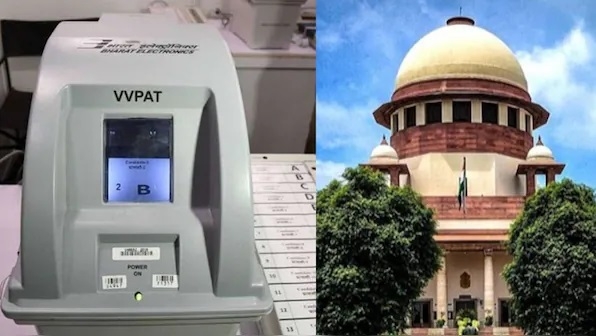SC ‘no’ to 100% verification of EVM votes with VVPAT
| Date :27-Apr-2024 |

NEW DELHI :
The bench headed by Justice Khanna issued two directives:
It asked Election Commission to seal and store units used to load symbols for 45 days after the
symbols have been loaded to EVMs in strong rooms.
Also asked to allow engineers of the
EVM manufacturers to verify microcontroller
of the machines after declaration of the results on the request
of candidates
Justice Datta, authored a separate opinion, concurring with the directions issued by Justice Khanna. He said,
concerted effort to weaken India’s progress has to be ‘nipped in the bud’
SUPREME Court on Friday rejected pleas seeking complete cross-verification of votes cast using EVMs with a Voter Verifiable Paper Audit Trail (VVPAT) and said “blindly distrusting” any aspect of the system can breed unwarranted scepticism.
Maintaining that “democracy is all about striving to build harmony and trust between all institutions”, a bench of Justices Sanjiv Khanna and Dipankar Datta delivered two concurring verdicts and dismissed all the pleas in the matter, including those seeking to go back to ballot papers in elections.
The court issued two directives. Pronouncing his verdict, Justice Khanna directed the Election Commission to seal and store units used to load symbols for 45 days after the symbols have been loaded to electronic voting machines in strong rooms.
The apex court also allowed engineers of the EVM manufacturers to verify the microcontroller of the machines after declaration of the results on the request of candidates who stood second and third.
Request for the verification of the microcontroller can be made within seven days of declaration of the results after payment of fees by the candidate making the request, the court said. “If EVM is found tampered during verification, fees paid by the candidates will be refunded,” it said.
An EVM comprises
three units -- ballot unit, control unit and the VVPAT. All three are embedded with microcontrollers which have
a burnt memory from the
manufacturer.
Currently, the Election Commission conducts random matching of VVPAT slips with EVMs at five polling booths per Assembly constituency.
“While maintaining a balanced perspective is crucial in evaluating systems or institutions, blindly distrusting any aspect of the system can breed unwarranted scepticism...,” Justice Datta said. The bench also asked the EC to examine the EVM for vote counting the paper slips and whether along with the symbol there can be a bar code for each party.
Besides seeking to return to the ballot paper system, the three petitions before it had prayed that VVPAT slips should be given to the voter to verify and put in the ballot box for counting and there should be 100 per cent counting of VVPAT slips, the bench said. “We have rejected all of them,” Justice Khanna said.
Hearing the matter on April 24, the bench had said it cannot “control the elections” or issue directions simply because doubts have been raised about the efficacy of EVM.
The petitions had claimed the polling devices can be tinkered with to manipulate the results. NGO Association for Democratic Reforms, one of the petitioners, had sought reversal of the poll panel’s 2017 decision to replace the transparent glass on VVPAT machines with an opaque glass through which a voter can see the slip only when the light is on for seven seconds.
The petitioners have also sought the court’s direction to revert to the old system of ballot papers.
Justice Dipankar Datta in his statement said that there seems to be a concerted effort to discredit, diminish and weaken India’s progress on every possible frontier and any such attempt has to be “nipped in the bud”.
Writing his views in a separate verdict while concurring with the opinion of Justice Sanjiv Khanna, who was heading the bench, Justice Datta said question of reverting to “paper ballot system”, on facts and in the circumstances, does not and cannot arise.
“It is of immediate relevance to note that in recent years, a trend has been fast developing of certain vested interest groups endeavouring to undermine the achievements and accomplishments of the nation, earned through the hard work and dedication of its sincere workforce,” he said. He said no constitutional court would allow such attempt to succeed as long as the court has a say in the matter.
“I have no hesitation to accept the submission of senior counsel for the ECI (Election Commission of India) that reverting to the ‘paper ballot system’ of the bygone era, as suggested, reveals the real intention of the petitioning association to discredit the system of voting through the EVMs and thereby derail the electoral process that is underway, by creating unnecessary doubts in the minds of the electorate,” Justice Datta said.
He observed it is only improvements in the Electronic Voting Machines (EVMs) or even a better system that people would look forward to in the ensuing years. “I have serious doubt as regards the bona fides of the petitioning association when it seeks a reversion to the old order. Irrespective of the fact that in the past efforts of the petitioning association in bringing about electoral reforms have borne fruit, the suggestion put forth appeared inexplicable,” he said.
Justice Datta said one cannot be oblivious that in a society pledged to uphold the rule of law, none - howsoever high or low – is above the law.